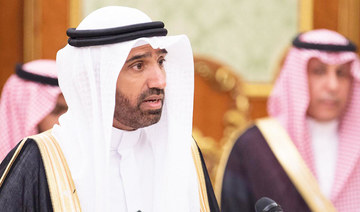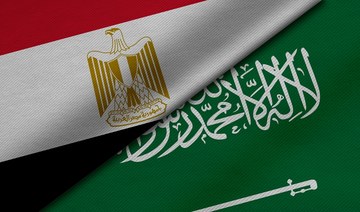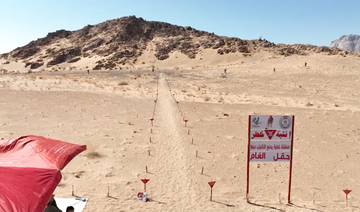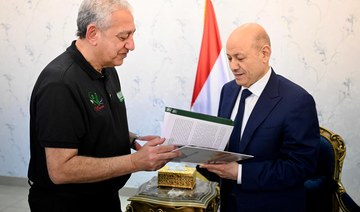RAS AL-KHAIR/JUBAIL: Custodian of the Two Holy Mosques King Salman inaugurated Tuesday a group of basic infrastructure and development projects in Jubail and Ras Al-Khair industrial cities on the Gulf coast.
The inauguration ceremonies were attended by Eastern Province Gov. Prince Saud bin Naif and a number of princes, ministers, government officials, private sector officials, and other dignitaries.
The king inaugurated the Sadara Chemical Company (Sadara) and the Saudi Aramco Total Refining and Petrochemical Co. (SATORP) in Jubail. The two projects are among the largest facilities in the refining and petrochemicals industries that support the objectives of Saudi Vision 2030.
The Vision aims to create new industries that will help provide new job opportunities for Saudis, as well as attract foreign investment to the Kingdom. Sadara and SATORP are aligned with these objectives and are the result of successful partnerships between Saudi Aramco and two global companies — the Dow Chemical Company and Total — which are leaders in their respective areas of business.
Minister of Energy, Industry and Mineral Resources Khalid Al-Falih, who is also chairman of Saudi Aramco, said: “Sadara and SATORP represent a bold undertaking for Saudi Aramco and its respective partners, Dow Chemical and Total. It is a major driver in achieving our goals of greater integration and value addition. They represent the concrete realization of our distinct yet complementary corporate visions — it is one way in which Saudi Aramco is helping to deliver on its abiding commitment to the Kingdom.”
The Sadara project is the largest integrated chemicals complex in the world to be built in one phase. It is a joint venture between Saudi Aramco and The Dow Chemical Company in Jubail Industrial City. The first phase commenced operations in 2015, and the remaining operating units are scheduled for completion by the end of 2016. The production capacity is more than 3 million tons of various plastics and chemical products annually.
The king also laid the cornerstone of the King Salman International Complex for Maritime Industries & Services, near Jubail, which was named in his honor during the groundbreaking ceremony. The complex is a commercial maritime project that complements the growth of the Saudi energy industry and helps to meet the development, localization and diversification objectives outlined by Saudi Vision 2030.
The development of the complex will start with a maritime yard as an anchor project to be completed in 2021. It will be managed and maintained by Saudi Aramco’s proposed joint venture with The National Shipping Company of Saudi Arabia (Bahri), Hyundai Heavy Industries Co, and Lamprell PLC. The facility will offer quality, efficiency and economies of scale, and when completed it will offer vessel and rig build, maintenance, repair and overhaul services. The project will comply with all of the Saudi government’s environmental and sustainability requirements.
At Ras Al-Khair, Al-Falih gave a speech in which he expressed his pleasure at the king's presence on the occasion of the inauguration of the development projects. The projects, he said, would put Ras Al-Khair on the map as a key contributor to an integrated and productive economy as one of the Kingdom's developmental successes and a source of pride.
“Like your father, King Abdulaziz (may he rest in peace), who was the Kingdom’s founder, and who had the vision and insight to launch the Saudi oil industry immediately after the country's unification, you today are inaugurating a comprehensive group of projects for the mineral resources sector in Ras Al-Khair Industrial City, and in turn making it a launch pad to move toward broader development, growth and prosperity for the Kingdom and its people,” said the minister.
“What we celebrate today is a true embodiment of the keenness to diversify sources of income in the national economy and open the doors for strategic industries to operate and flourish,” he added.
“For this, we are committed, under your guidance, to ensure these projects are founded on the same solid foundations that have contributed to the success of previous strategic initiatives, namely: Conscious investment and diligent planning for the country’s resources and wealth; commitment to the highest levels and international standards of planning and implementation; keenness to establish strategic partnerships with relevant international institutions; cautious increase of local content in these projects; serious and consistent investment in national human resources through training, rehabilitation and employment generation.”
“The government has sought to support the development of the mineral resources sector as per new and exceptional competitive outputs, and with large investments exceeding SR130 billion allocated to developing the establishment of basic infrastructure, including trains, water and power plants, ports, networks of gas and sulfur, phosphate and aluminum factories linked to mines founded by Maaden, the Saudi Arabian Mining Company. Maaden today is classified among the 10 largest mining companies in the world, only 9 years after it was founded,” he said.
The minister also thanked all involved parties for the notable success, saying, “I take this opportunity to extend my thanks to all our partners, particularly the Saudi Railway company for its outstanding efforts regarding the North South Railway Line Project, which has a length of 3,000 km. It can help Maaden Phosphate and Maaden Aluminum deliver phosphate and bauxite ore from mines in the north and center of the Kingdom to manufacturing areas in the cities of Ras Al-Khair.”
The development and mining infrastructure projects in Ras Al-Khair include the railway project, the mining train, the Ras Al-Khair water desalination and power plant, Ras Al-Khair port, Maaden phosphate mine in Jalamid in the Northern Border Region, Al-Ba’itha bauxite mine in Qassim, Maaden phosphate complex in Ras Al-Khair, and Maaden Aluminum complex also at Ras Al-Khair.
They also include basic infrastructure projects carried out by the Royal Commission for Jubail and Yanbu, which is the management and operation body in Ras Al-Khair.
King Salman inaugurates mega projects in Ras Al-Khair, Jubail
King Salman inaugurates mega projects in Ras Al-Khair, Jubail
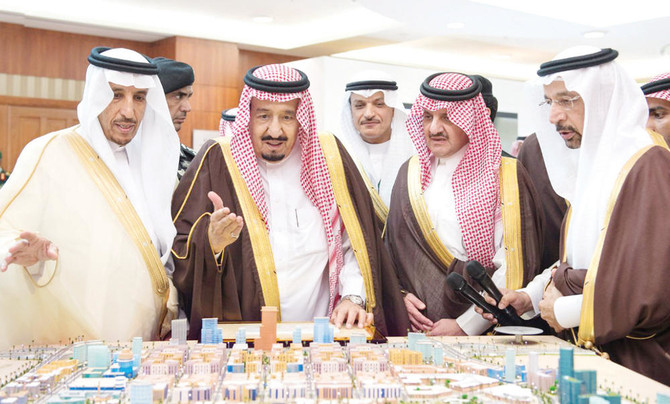
Saudi FM: Gaza committee stresses need for sanctions on Israel
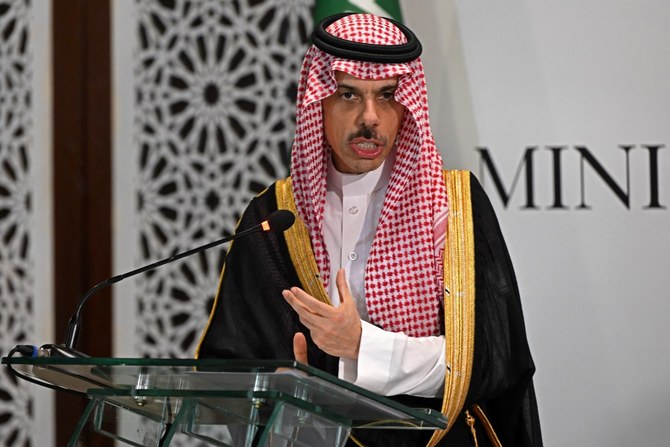
- Ministers also addressed the repression faced by peaceful demonstrators in Western nations who advocate for an end to the conflict in Gaza and condemn Israeli violations against Palestinians
Saudi Foreign Minister, Prince Faisal bin Farhan, stated Sunday that the Gaza Committee convened in Riyadh emphasized the urgency of imposing sanctions on Israel, as reported by the Saudi Press Agency.
The ministers advocated for halting arms exports in response to Israel's violations of international law and war crimes in Gaza and the occupied West Bank.
The ministerial committee, comprising dignitaries from Arab and Islamic nations, convened to address Gaza Strip developments and called for international legal mechanisms to hold Israeli officials accountable, alongside decisive action against settler terrorism.
It was strongly asserted during the meeting that the Gaza Strip constitutes an inseparable part of the occupied Palestinian territory, rejecting any attempts to displace the Palestinian population from their homeland or to carry out military operations within the city of Rafah.
Ministers also addressed the repression faced by peaceful demonstrators in Western nations who advocate for an end to the conflict in Gaza and condemn Israeli violations against Palestinians.
The meeting also focused on enhancing joint Arab and Islamic efforts to achieve an immediate cessation of hostilities in Gaza, with a priority on safeguarding civilian lives and ensuring the consistent delivery of humanitarian aid.
There was a commitment to persist in international endeavors aimed at recognizing an independent Palestinian state. This included the endorsement of a two-state solution, with East Jerusalem as its capital within the borders of June 4, 1967, in alignment with relevant international resolutions.
Saudi deputy minister attends 50th Arab Labor Conference
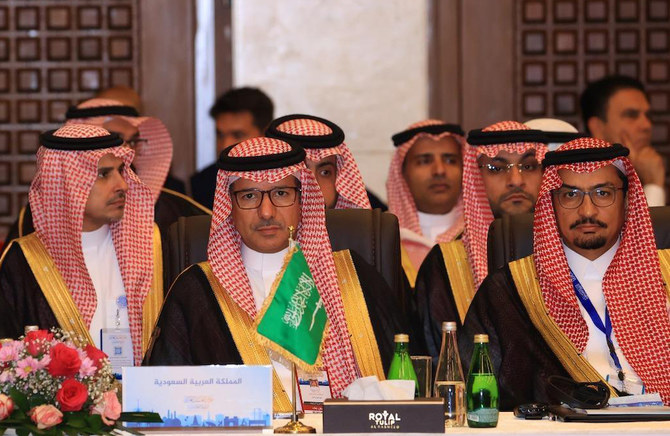
RIYADH: Saudi Deputy Minister of Human Resources and Social Development for Labor, Abdullah bin Nasser Abu Thanin, led the Saudi delegation at the 50th session of the Arab Labor Conference, being held from April 27 to May 4 in Baghdad.
Labor ministers, heads and members of delegations from employers’ organizations, and labor unions from 21 Arab countries, along with representatives from the Arab League and other Arab and international organizations, are attending the conference.
The opening session of the conference included the Iraqi Prime Minister, Mohammed Shia Al-Sudani; Arab League Secretary-General, Ahmed Aboul Gheit; and Director General of the International Labor Organization, Gilbert Houngbo.
During the plenary session of the conference, Abu Thanin delivered a speech in which he emphasized the importance of early qualification and training to meet the labor market’s needs, highlighting technical, personal, and social skills as well as modern work patterns.
Abu Thanin also highlighted the Kingdom’s significant commitment to investing in and developing human resources through the Vision 2030 programs and labor market strategy, along with its various initiatives.
He also pointed out the ministry’s initiative in holding the Global Labor Market Conference in partnership with the International Labor Organization and the World Bank, with the participation of a group of international experts and specialists with the aim of setting plans for future changes in the labor market.
The conference participants are expected to discuss several issues and reports, including the arrangement and coordination of Arab participation in the activities of the upcoming International Labor Conference organized by the International Labor Organization, scheduled to be held in Geneva.
The Arab Labor Organization is one of the organizations of the Arab League, established in 1965. It is considered the first specialized Arab organization concerned with labor and workers’ affairs at the level of the Arab world.
Saudi project clears 797 Houthi mines in Yemen
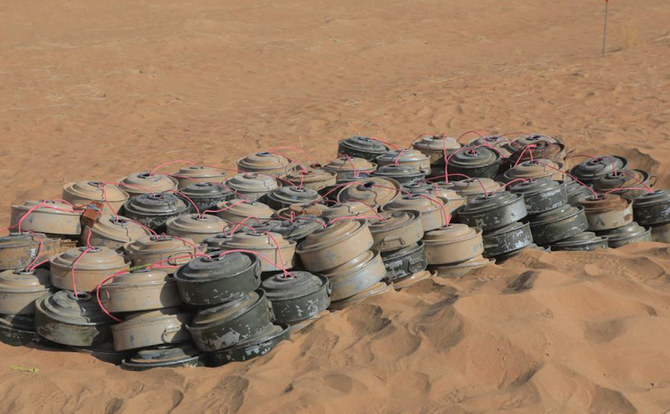
RIYADH: Saudi Arabia’s Project Masam cleared 797 mines in Yemen — which had been planted by the Houthi militia — between April 20 to 26, according to a recent report.
Overseen by the Kingdom’s aid agency KSrelief, the project’s special teams destroyed 681 pieces of unexploded ordnance, 110 anti-tank mines, five improvised explosive devices, and one anti-personnel mine.
The explosives, which were planted indiscriminately by the Houthis across Yemen, posed a threat to civilians, including children, women and the elderly.
Project Masam is one of several initiatives undertaken by Saudi Arabia at the request of King Salman, which has cleared routes for humanitarian aid to reach the country’s citizens.
The demining operations took place in Marib, Aden, Jouf, Shabwa, Taiz, Hodeidah, Lahij, Sanaa, Al-Bayda, Al-Dhale and Saada.
A total of 438,413 mines have been cleared since the start of the initiative in 2018, according to Ousama Al-Gosaibi, the project’s managing director.
These include 279,683 items of unexploded ordnance, 144,211 anti-tank mines, 8,023 improvised explosive devices, and 6,496 anti-personnel mines.
The initiative trains local demining engineers and provides them with modern equipment. It also offers support to Yemenis injured by the devices.
About 5 million people have been forced to flee their homes since the beginning of the conflict in Yemen, many of them displaced by the presence of land mines.
Masam teams are tasked with clearing villages, roads and schools to facilitate the safe movement of civilians and the delivery of humanitarian aid.
The project’s contract was extended for another year in June 2023 at a cost of $33.29 million.
Conflict is greatest threat to global economy, Saudi finance minister warns
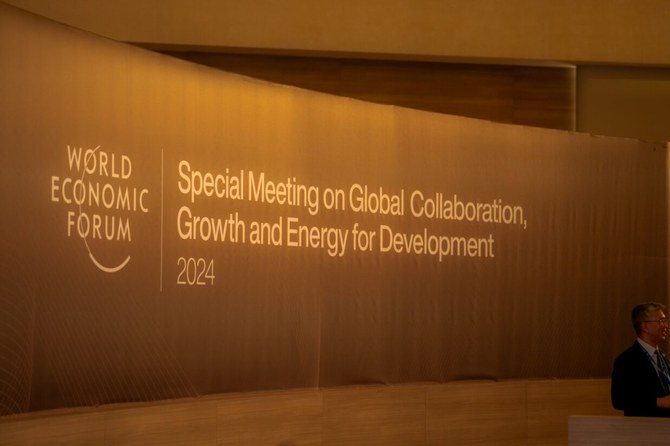
- Mohammed Al-Jadaan: Wars in Gaza, Ukraine ‘put a lot of pressure on economic emotion’
- Saudi Arabia’s ‘specific objective’ is to deescalate regional tensions, he tells World Economic Forum panel
RIYADH: Geopolitical threats such as the conflicts in Gaza and Ukraine pose the greatest risk to the global economy, Saudi Arabia’s finance minister has said.
Speaking in a panel discussion during the special two-day World Economic Forum meeting in Riyadh, Mohammed Al-Jadaan warned that the knock-on effects of conflict are “directly impacting economies.”
He said: “Geopolitical threats, which unfortunately are increasing instead of decreasing, are possibly the number one risk today if you look at the global economy at large. Geopolitical tensions bring other things that are directly impacting economies.”
Conflicts in Gaza, Ukraine and elsewhere “put a lot of pressure on economic emotion,” he added, describing economies as being “impacted by sentiments.”
Al-Jadaan said: “It is very unfortunate to see loss of lives. Civilian lives are important whether in Ukraine, or in Palestine.
“Cool-headed countries and leaders need to prevail; you need to make sure you deescalate.”
The Kingdom has exerted significant efforts in recent years to deescalate tensions in the Middle East, he added, describing the strategy as a “specific objective” of Saudi Arabia.
“The region needs to focus on its people, its growth and its economy, rather than focus on politics and conflict.”
The conflict in Gaza, which began following the Hamas-led assault on southern Israel on Oct. 7 last year, has resulted in the deaths of almost 35,000 Palestinians, mostly women and children.
Palestinian President Mahmoud Abbas, who took part in a separate panel at the meeting, said that “110,000 people have been killed or wounded in Gaza since Oct. 7 ” and that “75 percent of the territory” in the enclave has been destroyed by devastating Israeli military action.
“What happened in Gaza has not happened in Germany and other European countries during the Second World War,” he said, adding: “The fighting in Gaza must stop immediately and we warn against any plans for displacement.”
The Saudi finance minister warned that “geopolitical maneuvering,” including “fragmentation, protectionism and using the economy as a serious tool to achieve objectives in terms of limitations on trade and technology” could have adverse effects on global economic health.
“Policymakers need to be agile in dealing with these,” Al-Jadaan said.
Kristalina Georgieva, the managing director of the International Monetary Fund, described fragmentation in the world economy as “certainly bad for the prospect of growth.”
In the meeting’s opening panel, she said: “The immediate priorities for countries are to get inflation rates within targets; focus on rebuilding fiscal buffers and find ways to cooperate more.
In his comments to the panel, Al-Jadaan said: “In economic planning, it is OK to change … to adjust on new circumstances. And that to me is the advice I would give to everyone. You need a long-term plan, like Saudi Vision 2030, and doubling down on the implementation, but also you need to make sure you adjust.
“In the longer term, regardless of what is happening today, you need to focus on your own people, your human capital. This is the longer term play that is critical.
“I can say this: Saudi Arabia and the region has the means to do it, but there are a lot of countries who will find it difficult to provide quality education and quality healthcare for their people,” he said.
About 1,000 officials, experts and thought leaders from 92 countries are in Riyadh for the World Economic Forum’s Special Meeting on Global Collaboration, Growth and Energy for Development.
The event aims to “promote forward-thinking approaches to interconnected crises, while remaining realistic about shorter-term trade-offs” and “work to bridge the growing North-South divide on issues such as emerging economic policies, the energy transition and geopolitical shocks.”
Heba Ismail brings Saudi representation to NFT ecosystem
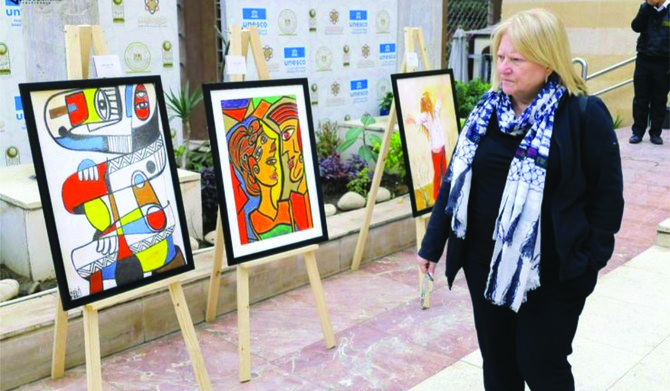
- Heba Ismail is highlighting ways for artists to flourish in the digital world
JEDDAH: Saudi artist Heba Ismail showcased her work at the Outer Edge Innovation Summit in Riyadh this week.
Commenting on her experience at the summit as one of the first Saudi artists to venture into the Web3 art scene, she said: “Having my paintings displayed on the event screens is a tremendous honor, offering global visibility and inspiring more Saudi and Arab artists to explore the diverse options available for sharing their art with the world.

“Through my participation with Nuqtah, the first Saudi NFT platform, I am eager to present my art on a global stage and connect with audiences in innovative ways,” she continued.
Non-fungible tokens — or NFTs — are, in this scenario, digital tokens that can be redeemed for a digital art work. Ismail is exploring their potential in the Saudi art scene.
HIGHLIGHTS
• With a professional background in dentistry, Heba Ismail found parallels between that meticulous work and her own creative process.
• Partnering with ChainVisory, a blockchain consultancy company, Ismail launched the Hebaism brand.
• It combines NFTs and original paintings, providing collectors with both digital and physical assets.
For Ismail, art has always been more than just a hobby — it’s been a lifelong calling. With a professional background in dentistry, Ismail found parallels between that meticulous work and her own creative process.

Inspired by movements including cubism, fauvism, and surrealism, Ismail’s art is a fusion of diverse influences and personal narratives “Each face represents a feeling and a vision documented on a painting. I paint poetry, and often times each piece is accompanied by a poem,” she said. “As a Saudi female, most of my paintings represent myself and my Saudi culture, which I am proud of. The characters are coded feelings, faces that tell a story — either joy, sadness, or acrimony.”

Her introduction to NFTs came in 2021, sparking a fascination with the technology and its potential. Partnering with ChainVisory, a blockchain consultancy company, Ismail launched her Hebaism brand, which combines NFTs and original paintings, providing collectors with both digital and physical assets.
As a female Saudi artist, I want to leave a mark and impact on every art platform, putting Saudi art on the map worldwide.
Heba Ismail, Saudi artist
“I wanted to keep the authentic classical painting process, yet the NFT world gave me a chance to meet and discover different ways to share my art and build a name and a brand,” she said. “It’s been an enlightening journey, uncovering the futuristic art process and connecting with a vibrant community through Web3.”
Ismail hopes to inspire other artists in the region to explore new avenues for artistic expression.
“As a female Saudi artist, I want to leave a mark and impact on every art platform, putting Saudi art on the map worldwide,” she said.


